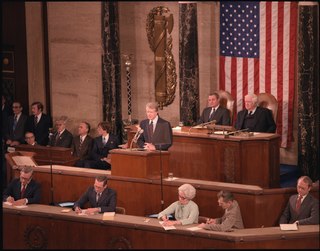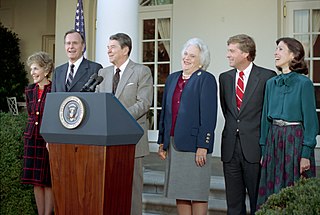The Presidential Medal of Freedom is the highest civilian award of the United States, alongside the Congressional Gold Medal. It is an award bestowed by decision of the president of the United States to "any person recommended to the President for award of the Medal or any person selected by the President upon his own initiative," and was created to recognize people who have made "an especially meritorious contribution to (1) the security or national interests of the United States, or (2) world peace, or (3) cultural or other significant public or private endeavors." The award is not limited to U.S. citizens, and, while it is a civilian award, it can also be awarded to military personnel and worn on the uniform. It was established in 1963 by President John F. Kennedy, superseding the Medal of Freedom that was initially established by President Harry S. Truman in 1945 to honor civilian service.

The Advisory Council on Historic Preservation (ACHP), an independent United States federal agency, is charged with the mission to promote the preservation of the nation's diverse historic resources. The ACHP advises the President and Congress on national historic preservation policy and also provides a public forum for stakeholders and the public to influence federal agency decisions regarding federal projects and programs that affect historic properties. The ACHP promotes the importance of historic preservation to foster an understanding of the nation's heritage and the contribution that historic preservation can make to contemporary communities, along with their economic and social well-being.

Richard M. Moose was an American executive and diplomat, who held senior government positions in Democratic administrations in the 1970s to 1990s.
The President's Committee on Civil Rights was a United States presidential commission established by President Harry Truman in 1946. The committee was created by Executive Order 9808 on December 5, 1946, and instructed to investigate the status of civil rights in the country and propose measures to strengthen and protect them. The committee submitted the report of its findings, entitled To Secure These Rights, to President Truman in December 1947, and Truman proposed comprehensive civil rights legislation to Congress, and ordered antidiscrimination and desegregation throughout the government and armed forces.
During President Jimmy Carter's presidency, he nominated four people for four different federal appellate judgeships who were not processed by the Democratic-controlled Senate Judiciary Committee before Carter's presidency ended. None of the four nominees were renominated by Carter's successor, President Ronald Reagan. Three of the nominees who were not processed were nominated after July 1, 1980, the traditional start date of the unofficial Thurmond rule during a presidential election year. All four seats eventually were filled by appointees of President Ronald Reagan.

The 1975 State of the Union address was given by President Gerald Ford to a joint session of the 94th United States Congress on January 15, 1975. The speech was the first State of the Union address of President Ford's tenure as president.
The 1991 State of the Union Address was given by the 41st president of the United States, George H. W. Bush, on January 29, 1991, at 9:00 p.m. EST, in the chamber of the United States House of Representatives to the 102nd United States Congress. It was Bush's second State of the Union Address and his third speech to a joint session of the United States Congress. Presiding over this joint session was the House speaker, Tom Foley, accompanied by Dan Quayle, the vice president, in his capacity as the president of the Senate.
The 1980 State of the Union address was given by President Jimmy Carter, the 39th president of the United States, to a joint session of the 96th United States Congress on January 23, 1980. Carter addressed the Iran Hostage Crisis and the Soviet invasion of Afghanistan: "At this time in Iran, 50 Americans are still held captive, innocent victims of terrorism and anarchy. Also at this moment, massive Soviet troops are attempting to subjugate the fiercely independent and deeply religious people of Afghanistan."

The 1979 State of the Union address was given by President Jimmy Carter to a joint session of the 96th United States Congress on January 23, 1979.
The 1978 State of the Union address was given by President Jimmy Carter to a joint session of the 95th United States Congress on January 19, 1978.

The 1976 State of the Union address was given by President Gerald R. Ford to a joint session of the 94th United States Congress on Monday, January 19, 1976.

The following is a timeline of the presidency of Lyndon B. Johnson from January 1, 1967, to December 31, 1967.

The following is a timeline of the presidency of Lyndon B. Johnson from January 1, 1968, to January 20, 1969.

The following is a timeline of the presidency of Richard Nixon from January 1, 1970, to December 31, 1970.
The following is a timeline of the presidency of Lyndon B. Johnson from January 1, 1964, to December 31, 1964.
The following is a timeline of the presidency of Richard Nixon from January 1, 1974, to August 9, 1974, when, in the face of almost certain impeachment and removal from office, he resigned the presidency.

The presidential transition of George H. W. Bush began when then-Vice President Bush won the United States 1988 United States presidential election, becoming the president-elect, and ended when Bush was inaugurated on January 20, 1989.
Allan I. Mendelowitz is the former chairman and director of the Federal Housing Finance Board, which regulates the Federal Home Loan Bank System.








